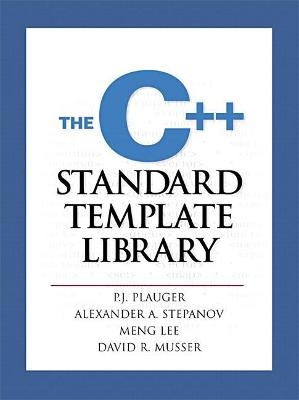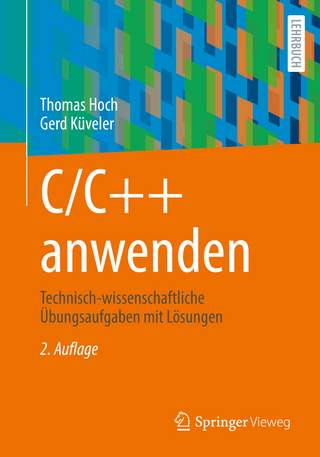
C++ Standard Template Library, The
Pearson (Verlag)
978-0-13-437633-2 (ISBN)
With the C++ Standard Template Library (STL), C++ developers have a powerful toolset for maximizing productivity, software quality, and performance at the same time. STL provides both a comprehensive set of container classes and fundamental algorithms to go with them -- a large, systematic, clean, formally sound, comprehensible, elegant and efficient framework for C++ development. Now, in this long-awaited book, the creators of the C++ Standard Template Library explain it authoritatively and in depth.KEY TOPICS:Each chapter of The Standard Template Library covers one STL component, including background, a review of the standard, techniques for using and implementing the component, and hands-on exercises. Appendices present lists of reserved names, a detailed glossary of terms and references, and practical techniques for interfacing the STL with several leading C++ compilers.MARKET:For every experienced C++ programmer.
P.J. Plauger is President of Dinkumware, Ltd., which licenses standards-conforming C and C++ libraries and documentation. For many years, he served as Senior Editor of The C/C++ Users Journal and Contributing Editor to Embedded Systems Programming. Plauger has long been active in the development of C and C++ international standards. Alex Stepanov, now at AT&T, formerly headed the Generic Programming Project at Hewlett-Packard Research Laboratories in Palo Alto, California. Meng Lee is currently a Technical Contributor at Hewlett-Packard Research Labs where she and Stepanov developed the original STL. The STL was proposed to and accepted by the ANCI/ISO C++ Standards Committee. David R. Musser, Professor of Computer Science at Rensselaer Polytechnic Institute, specializes in research on generic programming. His work with Stepanov provided the foundation for the STL.
0. Introduction.
Background. Functional Description. Using STL. Implementing STL. Testing STL. Exercises.
1. Iterators.
Background. Functional Description. Using Iterators. Exercises.
2. .
Background. Functional Description. Using . Implementing . Testing . Exercises.
3. .
Background. Functional Description. Using . Implementing . Testing . Exercises.
4. .
Background. Functional Description. Using . Implementing . Testing . Exercise.
5. Algorithms.
Background. Functional Description. Using Algorithms. Exercises.
6. .
Background. Functional Description. Using . Implementing . Testing . Exercises.
7. .
Background. Functional Description. Using . Implementing . Testing . Exercises.
8. .
Background. Functional Description. Using . Implementing . Testing . Exercises.
9. Containers.
Background. Functional Description. Using Containers. Exercises.
10. .
Background. Functional Description. Using . Implementing . Testing . Exercises.
11. .
Background. Functional Description. Using . Implementing . Testing . Exercises.
12. .
Background. Functional Description. Using . Implementing . Testing . Exercises.
13. .
Background. Functional Description. Using . Implementing . Testing . Exercises.
14. .
Background. Functional Description. Using . Implementing . Testing . Exercises.
15. . Background. Functional Description. Using . Implementing . Testing . Exercises.
16. .
Background. Functional Description. Using . Implementing . Testing . Exercises.
Appendix A: Interfaces.
Appendix B: Terms.
Appendix C: References.
Index.
| Erscheint lt. Verlag | 19.12.2000 |
|---|---|
| Sprache | englisch |
| Maße | 180 x 235 mm |
| Gewicht | 800 g |
| Themenwelt | Informatik ► Programmiersprachen / -werkzeuge ► C / C++ |
| ISBN-10 | 0-13-437633-1 / 0134376331 |
| ISBN-13 | 978-0-13-437633-2 / 9780134376332 |
| Zustand | Neuware |
| Haben Sie eine Frage zum Produkt? |
aus dem Bereich


